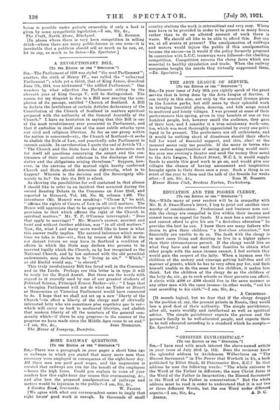A REVOLUTIONARY BILL. [TO THE EDITOR OF THZ " SPECTATOR."3
Sia,—The Parliament of 1258 was styled "the mad Parliament"; another, the sixth of Henry IV., was called the " unlearned Parliament"; while yet a third, that of King James, dissolved June 7th, 1614, was nicknamed "the addled Parliament." One wonders by what adjective the Parliament sitting in the eleventh year of King George V. will be distinguished. The reason for my disquiet is due to a Bill now nearing the com- pletion of its passage, entitled "Church of Scotland. A Bill to declare the lawfulness of certain Articles declaratory of the Constitution of the Church of Scotland in matters spiritual Prepared with the authority of the General Assembly of the Church." I have no hesitation in saying that this Bill is one of the most revolutionary ever presented to Parliament, and that it embodies in itself one of the most subtle attacks upon our civil and religious liberties. So far as one group within the nation is concerned—viz., the Church of Scotland—it eeke to abolish the Rule of Law, and practically asks Parliament to commit suicide. In corroboration I quote the end of Article VI.: "The Church and the State have the right to determine each for itself all questions concerning the extent and the con- tinuance of their mutual relations in the discharge of these duties and the obligations arising therefrom." Suppose, how- ever, in the exercise of the mutual right hereby conferred Church and State should determine differently, what is to happen? Wherein is the decision and the Sovereignty ulti- mately to lie? On this the Bill is silent.
As showing the possibilities for evil contained in that silence I should like to refer to an incident that occurred during the second Reading Debate in the Commons on June 22nd, and reported in Hansard, Vol. 143, No. 82, column 1,408. The introducer (Mr. Munro) was speaking I "Clause 3," he said, "affirms the rights of Courts of Law in all civil matters. The House will appreciate that to be appropriate as the correlative provision to that which affirms the right of the Church in spiritual matters." Mr. T. P. O'Connor interrupted : "Does that apply to marriage?" Mr. Munro's answer, succinct and brief and without further addition, was "in all civil matters." Now, Sir, what I and many more would like to know is what this answer really implies. The natural inference which mean- time we take is this—viz., that by reason of this Bill in the not distant future we may have in Scotland a condition of affairs in which the State may declare two persons to be married legally which the Church, as by law recognized as the National Church, and by law endowed with the old parochial endowments, may declare to be "living in sin." "Which," as old Euclid would say, "is absurd."
This truly revolutionary Bill has fared well in the Commons and in the Lords. Perhaps ere this letter is in type it will be ready for the Royal Assent. But these are the words with regard to it recently used by one of our greatest students of Political Science, Principal Ernest Barker—viz.: "I hope that a Georgian Parliament will not do what no Tudor or Stuart or Hanoverian or Victorian Parliament would have consented to do. I hope that we shall not set up a new 'liberty of the Church '—in effect a liberty of the clergy and of clerically interested laity who are sometimes plus royalistes que le roi- which will carry us back to mediaeval liberties, and abolish that modern liberty of all the members of the general com- munity which—if there be any progress—is the essence of the progress we have made since the Middle Ages came to an end."
—I am, Sir, &c., JOHN MIDDLETON. The Manse of Irongray, Dumfries.


































 Previous page
Previous page